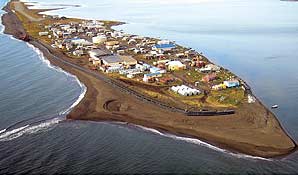Contains the keyword legal
NEW ORLEANS, Louisiana, August 30, 2010 (ENS) - Two environmental groups Friday filed a motion to intervene in the lawsuit brought by Texas Attorney General Greg Abbott and the State of Texas against the U.S. Environmental Protection Agency regarding the EPA's June 2010 disapproval of part of Texas' air permitting program.
Environmental Defense Fund and Environmental Integrity Project filed the motion in the U.S. Court of Appeals for the 5th Circuit in New Orleans.
The environmental groups are seeking to intervene on the side of the EPA. If they are allowed to intervene, they will argue that the agency properly disapproved the Texas Flexible Air Permitting program.
"Governor [Rick] Perry wants people to think that Washington is picking on him," said EDF energy program director Jim Marston. "The truth is he wants Texas to get a special pollution pass that no other state gets."
"All other 49 states follow the Clean Air Act, and it's time that politicians and polluters in Texas follow it, too," Marston said. "Our intent is to make sure this lawsuit considers the facts and science surrounding this issue and that re-election campaigns aren't waged in the courtroom."
See Molly Ivins. Bushwhacked: Life in George W. Bush's America

The West Virginia Highlands Conservancy, Friends of Blackwater, and former West Virginia State Park Chief Cordie Hudkins have taken the fight over the proposed drilling for natural gas in Chief Logan State Park to the West Virginia Supreme Court of Appeals. There they have been joined by the West Virginia chapter of the Sierra Club as well as the West Virginia Division of Natural Resources and the West Virginia Department of Energy who also oppose the drilling.
The controversy is over a proposal by Cabot Oil and Gas to drill several gas wells inside Chief Logan State Park. The Department of Environmental Protection had originally denied the permit to drill based upon a statute which it believed prohibited drilling for gas in a state park. Cabot Oil and Gas (the driller) appealed to the Circuit Court of Logan County which reversed the Department of Environmental Protection and ordered that the permit be issued.
The case also has the potential to interfere with an important source of funding for West Virginia’s parks and recreation. West Virginia receives extensive funding for its parks from the federal Land and Water Conservation Fund. A condition of that funding is that the land dedicated for park use remain so and not be converted for non-recreational use. If West Virginia allows part of Chief Logan to be converted from recreational use to minerals extraction, this would interfere with funding under this program.
Perched on an Alaskan barrier island, the village of Kivalina faces imminent destruction because of melting sea ice.

Kivalina, Alaska, has sued energy companies over
melting sea ice that threatens the town.
AP Photo/Northwest Arctic Borough
Now, the community's legal effort — which pins the blame on energy companies for the change in climate — is in danger as well. So, too, is a pair of high-profile climate-change suits that may be taken up by the U.S. Supreme Court, one involving an effort by Connecticut and other states to reduce greenhouse-gas emissions, the other stemming from Hurricane Katrina.
See: Greenhouse Gas Emissions Case Heads to Supreme Court.
See: SCOTUS (Supreme Court of the United States) Blog.
All three suits rely upon the theory that climate change is a public nuisance and, therefore, state and local governments, as well as individuals who have been harmed, can sue for damages or injunctions. The Obama administration, in a recently filed brief in the Connecticut case, American Electric Power v. Connecticut, is arguing that it may not be prudent for the high court to allow these types of cases to go forward.
If the justices grant review, the stage could be set for reversal of a rare, recent high court victory for environmentalists, the 2007 decision in Massachusetts v. Environmental Protection Agency. The 5-4 ruling in the Massachusetts case found a special standing to sue for states that brought that first global-warming case to the Supreme Court. The majority also held that the Environmental Protection Agency (EPA) had authority under the Clean Air Act to regulate greenhouse-gas emissions.
"If the solicitor general gets the Court to take cert, I would be very confident they're going to undercut Massachusetts v. EPA," said environmental scholar Randall Abate of Florida A&M University College of Law. "The sooner the Court gets to revisit it, the more likely it will be gutted. The trend has been to be more restrictive on standing. This is really making the environmental community nervous and angry."
The Katrina-related case — In re Ned Comer — is also at the Supreme Court but is coming to justices in an unusual fashion — through a petition for a writ of mandamus. The Alaska case — Native Village of Kivalina v. Exxon Mobil Corp. — is undergoing briefing in the U.S. Court of Appeals for the 9th Circuit.
 "Each case has its legal strong points and each has its legal vulnerabilities," said James May of Widener University School of Law, who has filed amicus briefs on behalf of environmental law professors in the Connecticut and Kivalina cases.
"Each case has its legal strong points and each has its legal vulnerabilities," said James May of Widener University School of Law, who has filed amicus briefs on behalf of environmental law professors in the Connecticut and Kivalina cases.
"As a federal litigator for 15 years and a law professor for 20, what I find concerning is the executive branch stepping in front of states and private litigants who are trying to get their day in court. If this was the Bush administration doing this, I think it would be a very divisive political issue."
...The energy companies' case is now stronger because of the EPA's actions and the solicitor general's brief, he said. "I don't know if it gets you there finally. If I was writing plaintiffs' briefs, I would be pounding the table and saying, `If you're telling me this is a political question, the political arm to deal with this is Congress and they have done nothing.' "
 Which is exactly what Pawa, who represents three land trusts in the Connecticut case as well as the Kivalina villagers, said. "The solicitor general's brief is not very damaging because it was unpersuasive," Pawa said. "It's just wrong. It tries to repackage the political-question doctrine, which was thoroughly dealt with on its merits by the 2d Circuit, as prudential standing.
Which is exactly what Pawa, who represents three land trusts in the Connecticut case as well as the Kivalina villagers, said. "The solicitor general's brief is not very damaging because it was unpersuasive," Pawa said. "It's just wrong. It tries to repackage the political-question doctrine, which was thoroughly dealt with on its merits by the 2d Circuit, as prudential standing.
"And, there are no federal regulations applicable to existing coal-fired power plants. They haven't even been proposed. There have been some rules proposed for new plants, but no rules for existing plants, which are at issue in these lawsuits."
In looking at the various iterations of climate-change litigation, the most "evolved" of the three cases is Kivalina, according to Jones and others, and the one that worried most corporate defendants. "It contained a conspiracy count, which is what the plaintiffs' bar hoped would get them money damages," Jones said. "And it has more sympathetic and real plaintiffs than the other cases. Here you have a particular village that is going to be under water."
Kivalina from Cristina Valdivieso + Jon Connor on Vimeo.
Various scientific and government studies report that the right combination of storms could flood the entire village at any time and have recommended relocation at costs varying up to $400 million.
If the Court does not act on Connecticut or Comer, Jones said, "I think Kivalina will go forward. I think that one could end up being the most dangerous of any of them. But getting into court is one thing; proving causation is a very hard row to hoe."
See: Shearer, Christine. "My Journey Into Kivalina v. ExxonMobil et al." Countercurrents. Dec. 1, 2010.
See also: Shearer, Christine. Kivalina: A Climate Change Story. Haymarket Books, 2011. Print.
Elizabeth Larkin, Cortland County Clerk. You can search Land Records at the Cortland County Clerk's Office online and read the full-text of lease documents and see if your neighbors have already signed gas leases.
Instructions
Click "Search Land Records". On the next page, just click "Log In", you do not need a password. On the next page, click "I accept".
On the next page, uncheck "Ignore party type when search for name"; change the dates if you wish, choose "Document Type: Lease" from the drop-down menu.
Next to the field that says "Town", use the pull-down menu to pull down your town and then click the search button at the top right of the page. You can also try variations.
About the Landman Report Card
A landman is an agent that represents oil & gas companies in negotiations with landowners: their job is to get the best terms for the company. This interaction is perhaps one of the most important elements of the oil and gas exploration and extraction process.
Though many landmen sign onto and abide by codes of ethics, some landowners have accounts of landman dishonesty and misbehavior. Landowners are particularly vulnerable to misinformation at this moment as it is often the first time that they make contact with the oil and gas industry. The Landman Report Card was started to assist landowners in this tricky process by allowing landowners to educate and assist each other.
This site provides tools to learn about landmen and their companies through reading reviews submitted by users. It also allows users to submit their own report cards, contact other users and use the site as their own private diary of interactions with this industry.
The Landman Report Card is produced by the ExtrAct group at MIT in collaboration with citizens' alliances in Colorado, New Mexico, Ohio and West Virginia as well as the Oil and Gas Accountability Project. ExtrACT is funded by MIT's Center for Future Civic Media, a research group dedicated to developing novel web-based technologies for citizen journalism.
To get in touch with the ExtrAct team, email us at extract@media.mit.edu.
Posted on January 15, 2010 by William A. Ruskin.
"Is DEC Ill-Equipped to Oversee Marcellus Shale Natural Gas Drilling?"
"According to a report issued by Cornell Law School, the State of New York’s blueprint for Marcellus Shale development proposes 187 new regulatory activities necessary for the oversight of natural gas drilling, but the blueprint does not explain how DEC will carry out these activities."
Marcellus-Shale.us. 2019-2010. Website. Pennsylvania.
Key paragraphs from the
ENERGY POLICY ACT OF 2005
Includes photographs of fracking trucks.
See press release, U.S. Environmental Protection Agency (EPA): EPA Announces “Eyes on Drilling” Tipline.
Join us on September 25-27 in Washington, DC for Appalachia Rising!, a national response to the unmitigated destruction of Appalachia's mountains, air and water through mountaintop removal coal mining. Appalachia Rising! will follow a long history of action for a just and prosperous Appalachia.
Appalachia Rising, an event which will take place in Washington DC, September 25-27, 2010 is a national response to the poisoning of America’s water supply, the destruction of Appalachia’s mountains, head water source streams, and communities through mountaintop removal coal mining. It follows a long history of social action for a just and sustainable Appalachia.
Appalachia Rising strives to unite coalfield residents, grass roots groups, individuals, and national organizations to call for the abolition of mountaintop removal coal mining and demand that America’s water be protected from all forms of surface mining.
Appalachia Rising -building community/labor alliances from Anne Lewis on Vimeo.
More than a dozen families in Susquehanna County, Pa., filed a lawsuit late Tuesday against the Southwestern Energy Production Company, asserting that a succession of “releases, spills and discharges of combustible gases, hazardous chemicals and industrial wastes” from the company’s nearby drilling sites had contaminated their drinking water and made them sick.
In simpler terms, it’s the latest salvo against hydraulic fracturing — a long-used and highly contentious drilling technique that has come under more intense scrutiny as energy prospectors descend on newly accessible gas deposits under vast areas of Pennsylvania, West Virginia, Ohio and New York.
It’s not the first such lawsuit, and it comes amid a flurry of other legal, regulatory and political maneuvering around the topic at the local, state and federal levels...
...A draft of the most recent lawsuit was provided by the law firm representing the Susquehanna residents.














